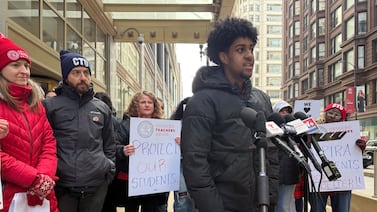Sign up for Chalkbeat’s free weekly newsletter to keep up with how education is changing across the U.S.
Twenty-four states and the District of Columbia are suing the Trump administration to restore billions in education funding that the federal government abruptly froze the day before those funds were supposed to be released.
The June 30 funding freeze held up nearly $7 billion that Congress already had allocated and which schools nationwide were counting on. The money was earmarked for teacher training, support for English learners and the children of migrant farmworkers, after-school and summer programming, literacy initiatives, and enrichment programs focused on STEM education, college and career counseling, and the arts, among other things.
School districts and state education departments that had already set their budgets for the coming school year were left scrambling. District leaders around the country said they may have to cancel afterschool programming that parents rely on and lay off staff who work with vulnerable populations.
“It is impossible for states to effectively budget for an upcoming school year through our departments of education to our local communities when the president takes the football away from us, like Lucy in a Charlie Brown cartoon,” said Rhode Island Attorney General Peter Neronha at a Monday press conference announcing the lawsuit.
The lawsuit, filed in U.S. District Court in Rhode Island, alleges that the funding freeze from the White House Office of Management and Budget violates the Constitution and federal laws, including the Administrative Procedure Act and the Impoundment Control Act. The plaintiffs argue that the administration did not follow rules that govern when the executive branch can refuse to spend money allocated by Congress.
California Attorney General Bob Bonta, who is co-leading the lawsuit with Rhode Island, described visiting a threatened summer program at an elementary school in Napa, California, and seeing children making minestrone soup, working on art projects, and getting lots of exercise playing “zombie tag.”
“I saw how much the program meant to those kids, how irreplaceable it is for them and their families,” he said. The county has been able to backfill lost federal funding for now, keeping the program open, but Bonta called that “a band aid solution.”
California schools and community groups are missing nearly $940 million, Bonta said.
New York Attorney General Letitia James called the funding freeze “illegal and unjustified” and said the consequences for students and families would be “devastating.”
At least 65,000 students in New York could lose access to summer and after-school programs and some 80,000 adults could lose access to adult education and literacy programs, according to New York State Education Department estimates. Federal funds also cover the salaries of 67 state employees, many of whom directly support school districts, officials said.
All told, New York is waiting on $463 million in frozen federal funds.
“Congress allocated these funds and the law requires they be delivered,” James said in a statement. “We will not allow this administration to rewrite the rules to punish the communities it doesn’t like.”
The officials that filed suit on behalf of the 24 states and D.C. are either Democratic attorneys general or Democratic governors. A coalition of Democratic attorneys general has sued the Trump administration repeatedly, winning the partial restoration of pandemic relief money, AmeriCorps funding, and more. Of 31 lawsuits brought by that coalition, eight have touched on education issues.
The lawsuit seeks the immediate restoration of funding only in the states that joined the lawsuit. Those include California, Colorado, Illinois, Massachusetts, Michigan, New Jersey, and Pennsylvania, among others. While the case comes several weeks after the U.S. Supreme Court rejected the concept of nationwide injunctions, the attorneys general said they would not have sought one in this case regardless.
The Education Department and the Office of Management and Budget did not immediately respond to requests for comment.
The Office of Management and Budget previously said it was conducting an ongoing programmatic review to ensure education funding aligns with “the president’s priorities.” A spokesperson also said, without providing evidence, that initial findings “have shown that many of these grant programs have been grossly misused to subsidize a radical leftwing agenda.”
The Trump administration accused New York of using English language acquisition funds to “promote illegal immigrant advocacy organizations” — a charge state officials denied — and Washington state of using those funds to “direct illegal immigrants towards scholarships intended for American students.”
However, Republican-led states have also been significantly affected. Indiana schools are out an estimated $107 million despite leaders there taking their own steps to eliminate programs associated with diversity, equity, and inclusion.
“This is not about political philosophy, this is about reliability and consistency,” Alabama state Superintendent Eric Mackey told Politico. “None of us were worrying about this.”
On Thursday, Democratic members of Congress sent a letter to Education Secretary Linda McMahon and Office of Management and Budget Director Russell Vought demanding to know how long the review would take and, if there were concerns, why the review wasn’t started earlier to minimize disruption.
“There is no legitimate reason why any review of these programs should prevent the Administration from fulfilling its responsibility to the American people on time,” the representatives wrote. “No more excuses – follow the law and release the funding meant for our schools, teachers, and families.”
Following the pattern of earlier lawsuits, Republican-led states are not officially challenging the funding freeze. However, they could still benefit if the Democratic states secure a win. The Trump administration quietly restored pandemic relief money to Republican states after Democratic attorneys general prevailed in court.
The withheld funds correspond to programs that the Trump administration had proposed eliminating in the 2026 fiscal year, but Congress has not voted on those changes. Even if approved, they would affect school districts’ 2026-27 budgets, not the upcoming school year.
This story has been updated to include additional information and comments from state attorneys general.
Correction: July 14, 2025: This story has been updated to accurately reflect which attorneys general are leading this lawsuit. New York is a party to the lawsuit. California and Rhode Island are co-leads, along with Colorado and Massachusetts.
Erica Meltzer is Chalkbeat’s national editor based in Colorado. Contact Erica at emeltzer@chalkbeat.org.





